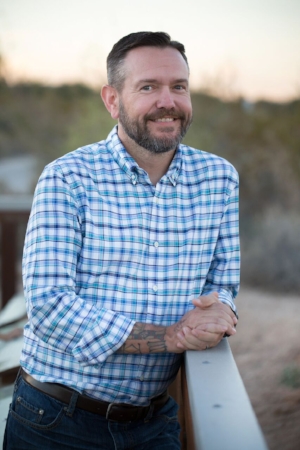TRANSITIVE
Jeremy Gregersen
It takes me an hour to find the plot,
or to wait for the plot to find me;
the graves almost crowd each other out,
the flat stones neatly checkered
into rows, plumbed into place
so that even with my faded photocopy
of a map of the dead
I am corralled back and forth
a quarter mile along the hilly rows
until beneath a blasted maple
alone in this expanse
of manicured crabgrass and dandelion,
her stone, somewhat swallowed
by its ten years’ rest, and its ragged
sunken cell stops me to kneel,
to place my gas station bouquet sheepishly
aslant across the corner of her marker,
and to observe the formalities of fading grief
familiar as a lover’s sleeping breath.
I take cold comfort in the rites,
in the rituals, in repeating
what I’ve seen repeated in movies and TV;
I’m imbued with the soaps, the after-
school specials dealing with death just so.
All while I fear I cannot do a thing
without recasting every action
as an action done to me—
so that in this graveyard this close to her
murdered bones I feel every bit
the weary object of every verb
ever performed—as though
even her slow and bleeding death
was a thing that I endured.
As though I could know the terror
of the intrusion, the brittle thickness of that
fear, that chaos, moving as I had
a full five states away. As if I could
somehow feel my own fading pulse as the bedsheets
brightened with my own blood.
As though my feelings on the matter mattered.
And even the roses I’ve brought along
seem self-serving as a hooker’s gaudy kiss,
a smear of crimson cellophane cliché
that calls up other walks and other flowers
from eleven years before: I am finding
my way home from my five long hours of the U.
of Utah’s summer term intensive French,
stealing tulips for her from the front yards
of Salt Lake’s largest gothic homes,
rehearsing dutifully the irregular
verb faire—a strange catchall
to my Anglophonic ear.
It means “to do” or “to make”
in all the strangest ways:
As in Je fait du ski (I do skiing),
or Il fait du soleil (It does sunniness),
or L’assassine a fait une victime
(The murder made one victim).
I wonder lightly at making so many
objects direct objects,
as though we and most things never
truly act, but are only acted upon,
as I turn down her street, dallying
toward dalliance, knowing she’ll be home,
never slowing to ask if “philander”—
itself a French-English cognate—
can be used as a transitive verb, never
wondering aloud whom our affections
were meant to affect,
whether cheating on my future-
wife-now-exwife was something
I did to her or me or to all three
of us at once, whether her murder
insured that marriage, or if my memories
of her sealed the hasty union’s
necessary end, as whether her gravestone
is pressing itself into the ground
or being swallowed slowly by its earth.
I brush the dry grass clippings
from the marker, from her
portrait embossed into the granite,
thinking I’d like less to wake
her on this anniversary of her death
than to have her awaken; if I could
I wouldn’t perform the miracle I want
performed. But there’s nothing miraculous
here, no sudden rainstorms or rainbows
or signs in the heavens to impact me
or the two men beginning the grim work
of digging yet another grave
not fifty feet away, firing up
the indifferent machinery, the rusting claws
asked to alter the object of the earth,
to pock its massive surface in service
of the dead, the sandy soil passive
and insensate as the machines and men who dig.
Jeremy Gregersen is a graduate of the MFA program at the University of Michigan. His work has appeared in many publications, including Cortland Review, Poet Lore, Cimarron Review, and The Maine Review. He lives in Las Vegas, Nevada with his wife and son, where he works as Head of School at The Meadows School, a college prep school for students in grades Pre-K through 12.

